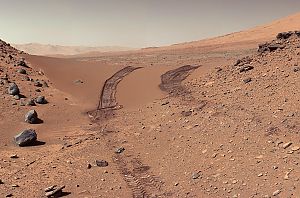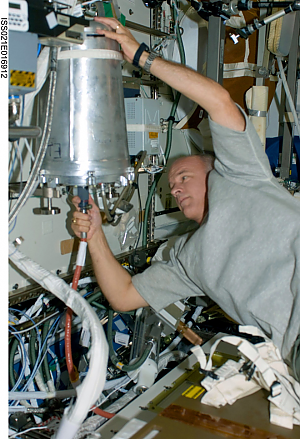#successstory - How the University of Graz ensures hygienic Mars Exploration

Twenty years ago, three astronauts were the first ones to step aboard the International Space Station (ISS). Since then, the I.S.S. has hosted hundreds of residents from many countries. What sounds like a crowded AirBnB apartment 400 km above the earth also has its challenges regarding the hygiene of the facilities. During the astronaut's stay on board it is important to ensure that microorganisms do not negatively affect their health.
A crewed Mars mission was already discussed in the book of the space pioneer Wernher von Braun after world war II and is now getting closer and closer and could become reality in around 15 to 20 years. In any case, the preparations for this are already in full swing. Important aspects are the health of the astronauts and the functionality of the spacecraft on the approximately 500-day journey through space. "In both cases, microorganisms play an important role," explains Univ.-Prof. Dr Christine Moissl-Eichinger, Professor of Interactive Microbiome Research at the Medical University of Graz.
Humans carry around 1014 - or 100 trillion - microorganisms. "Most of them are located in the intestines and on the skin," adds the expert. The so-called "microbiome" takes on important tasks and functions in the body and of course also travels with the astronauts into space. The hermetically sealed International Space Station ISS has been permanently inhabited by a crew since 2000, making it home to countless microorganisms. This may result in various problems: microorganisms in the space station, for example, can pose a risk to the technology on board, as they can attack surfaces and technical material. In addition, the immune system of astronauts in space is reduced, making them more susceptible to microbial infections. "For these reasons, the microbiome on board a spaceship must be subject to controlled conditions," says Christine Moissl-Eichinger.

As part of the research project "Archaeal and bacterial extremophiles on board the International Space Station - ARBEX" funded by the Austrian Research Promotion Agency FFG, the effects of the conditions of the ISS on the diversity and function of the microorganisms on board were examined, and compared with the "normal" microbiome of buildings and environments on earth. As part of this project, samples were taken on the ISS in 2017: Led by Christine Moissl-Eichinger's team, US astronaut Jack Fischer took wipe samples from various surfaces in the ISS. The Columbus module was sampled as well as the sleeping places of the astronauts and the so-called WHC (waste and hygiene compartment), including the toilet area.
The wipe samples from the ISS were painstakingly analyzed using "next-generation sequencing" and cultivation-based approaches. The international team (Austria, Germany, Great Britain, Russia, the Netherlands) gives the all-clear after careful analysis: "The ISS microbiome does not substantially differ from the microbiome of an indoor environment on earth and in terms of antibiotic resistance and other possibly health-impairing properties corresponds roughly to a classic bathroom microbiome, consisting of a mixture of skin, intestinal and environmental microorganisms," summarizes Christine Moissl-Eichinger. Although the microbiome within a spaceship does not pose an obvious "danger" to humans, quality standards and monitoring for manned spaceflight must nonetheless be developed in order to ensure the stability of the core microbiome and to prevent epidemics or technical difficulties.
For more information about ESA Space Solutions and related Business Applications, Business Incubation and Technology Transfer please visit ESA Space Solutions.
The European Space Agency (ESA) Technology Broker for Austria, is delivered by Brimatech and is part of ESA Space Solutions Centre Austria, managed and funded in collaboration with:
- ESA Space Solutions
- FFG – Aeronautics and Space Agency
- BMK – Federal Ministry Republic of Austria for Climate Action, Environment, Energy, Mobility, Innovation and Technology
- Science Park Graz – ESA BIC Austria
